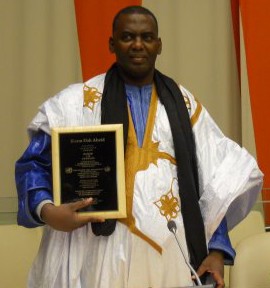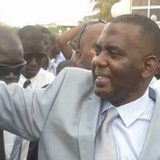Mauritanian activist Biram Dah Abeid: “When I was ten, I promised my father that I would fight slavery”
Biram Dah Abeid has been called ‘the Mauritanian Nelson Mandela’. And this comparison makes sense. Dah Abeid stands up for the suppressed black community in Mauritania, just like Nelson Mandela did in South Africa. Prison sentences don’t stop him from persisting in his peaceful resistance against racism and slavery.
Hundreds of years ago, the black farmers in the South of Mauritania were enslaved by the Arabic-Berber Moors from North Africa. Although the current situation in the country is complex, it’s painfully clear that many people continue to carry the consequences of the historical caste system: the Moorish part of the population is still at the top of the social ladder, while those belonging to the ‘haratin’ – the descendants of the slaves – are often considered to be second-class citizens.
Mauritania officially banned slavery in 1981, yet human rights organisations estimate that tens of thousands of people living on the African west coast are still ‘owned’ by others, facing exploitation. The men have to do heavy labour, while women and children are being forced to help in the slave master’s household. These people have no control over their fate, and they can be sold or given away at any time.
Hunger

The fact that Biram Dah Abeid, who was named one of the most influential people in the world by Time magazine, became the face of anti-slavery activism is a direct consequence of his haratin heritage and his youth. His father used to be a slave, and his mother still was one when Biram was born in 1965.
“My parents’ background played a decisive role in what I do today,” says Dah Abeid when we talk on Skype. “When you grow up as a member of a servile population group, you quickly feel that you belong to ‘a different category’. We had to work harder for less well-being. I had to combine my classes in the village school with herding cattle, felling trees, and selling herbs. If I hadn’t done that, our family wouldn’t have had any money for food. Children of Arabic-Berber descent only had to go to school; they had nothing else to worry about. When I went to secondary school, I could only afford one meal per day. I suffered a lot of hunger back then.”
But that didn’t curb his ambition – quite the opposite. “When I was ten, I promised my father that I would fight slavery. It was a conscious decision to study history and law: it would allow me to unravel the secrets of slavery.” He faced many hurdles during his higher education studies. “At one point, I had to discontinue my studies because I had no money for transport to the university. I had to work a couple of years before I was able to complete my studies.”
Turncoats
With the establishment of the Initiative de Résurgence du mouvement Abolitionniste (IRA) in 2008, Dah Abeid’s mission became very concrete: tackling slavery, racism, and discrimination at the source. In addition to organising protest and liberation actions, IRA mostly focuses on raising awareness. “Not an easy task, but we have to tackle the problems on various levels at the same time. First of all, we want to make the slaves realise that a free life is possible. We also want to reach their descendants, because they are victims just as much as their elders are: they still feel the repercussions of the suppression, the injustice, and the prejudices. We’re also addressing the international community. The economic and diplomatic support that the European Union and the African Union give to our government further strengthens the position of the slave traders. Economic and commercial interests seem to trump human rights.”

Dah Abeid believes that the injustice continues because those in power and the slave traders belong to the same ethnic elite; they’re in cahoots. “The result is that opponents of the system get arrested, convicted, and tortured. The media, which is largely owned by the higher caste, are demonising us. Journalists who criticise the government face legal action. The authorities portray us as enemies; we’re said to pose a national security threat. People with Arabic-Berber roots see our battle as an attack on their way of life, their economic and social privileges, and their religious practice. Some former brothers in arms have defected to the other camp for the sake of self-preservation. By turning their backs on us, they know they’ll have a good life.”
Who is Biram Dah Abeid?
°1965, Jidrel Mohguen, Mauritania
- Obtains a master’s degree in history.
- Joins the anti-slavery NGO SOS Esclaves after his studies and starts working for the organisation as a researcher.
- Founds the Initiative de Résurgence du mouvement Abolitionniste (IRA) in 2008, an organisation that fights slavery and racism in Mauritania.
- Is incarcerated multiple times for periods from a few months up to one year and a half. He spent five months in jail last year.
- Receives the United Nations Prize in the Field of Human Rights and the Front Line Defenders Award for Human Rights Defenders at Risk in 2013.
Barely any sleep
In 2012, the IRA leader publicly burned a couple of books with interpretations of the Quran, written by the Egyptian Cheikh Khalil in the ninth century AD. “Those writings, which are at the basis of the sharia law in our country, legitimise the objectification and sexual abuse of black slaves. Therefore, they blatantly go against the principle of equality, and they condone racism. And still, our government prides itself on respecting human rights. I burned those pages to bring attention to this.”
As a result, the activist was accused of blasphemy and defection, and he was incarcerated. President Mohamed Ould Abdel Aziz and other prominent figures demanded the death penalty. Under pressure from the European Union, Dah Abeid was released after four months. He was thrown in jail no fewer than four times in ten years. “Life in the Mauritanian prisons is extremely tough. You hardly get any sleep, and there is barely any food. There’s no care whatsoever if you become ill.”
Dah Abeid for president
Dah Abeid’s family has already been the target of several violent attacks. “My wife and daughter have already suffered a lot. My daughter broke her arm, and my wife injured her left knee. The violence used against us is unspeakable, but our duty to continue the fight keeps us in this country. So we face the fear and the danger until we prevail.”
The Mauritanian honorary doctor says he draws courage and strength from the idea that he’s giving people back their humanity. The promise he made to his father is a permanent source of motivation as well. He also sees enough progress to keep the hope alive. “We are managing to mobilise more and more people. We only had seven people when we founded the IRA. Today, we can count on thousands of militants. We also have about twelve divisions abroad: in Belgium, the US, Canada, Germany, Spain, Senegal, Mali, Ivory Coast and Brazil, among others. The regime has tried almost everything to eliminate us, but they didn’t succeed. We hope to seal this victory by winning the presidential elections in June this year.”
Life in the Mauritanian prisons is extremely tough. You hardly get any sleep, and there is barely any food. There’s no care whatsoever if you become ill.
In 2014, Dah Abeid came second in the presidential elections, but he had serious doubts regarding the fairness of the electoral process. This time, he believes he has a good chance of becoming president. “It’s five months before the elections, and I’m the only official candidate. Furthermore, I’m part of an alliance with Sawab, an Arabic political party that has been opposing President Mohamed Ould Abdel Aziz’s regime for ten years already. Since IRA has withstood all resistance, we have the sympathy of large sections of the population.”
“Furthermore, our programme is fair and relevant: we want to reform the country based on equality, the principles of the rule of law, and the distribution of wealth. We stand by the pacification of our society, meaning that we want to end the terror and arbitrariness that many Mauritanians are fed up with. That’s why our programme appeals to them. The first thing I’ll do, should I become president, is bring together all political parties, civil society members, syndicates, and social actors. Without making a distinction between my opponents and my supporters, or between Arabs and black Africans. A gesture of reconciliation.”
Biram Dah Abeid was nominated by Robbe Van Hoof, chair of the KU Leuven Student Council.
Peter Van Dyck, translated by Katrien Bollen & Shana Michiels
https://nieuws.kuleuven.be/en/content/2019/patronsaintsday-biram-dah-abeid



